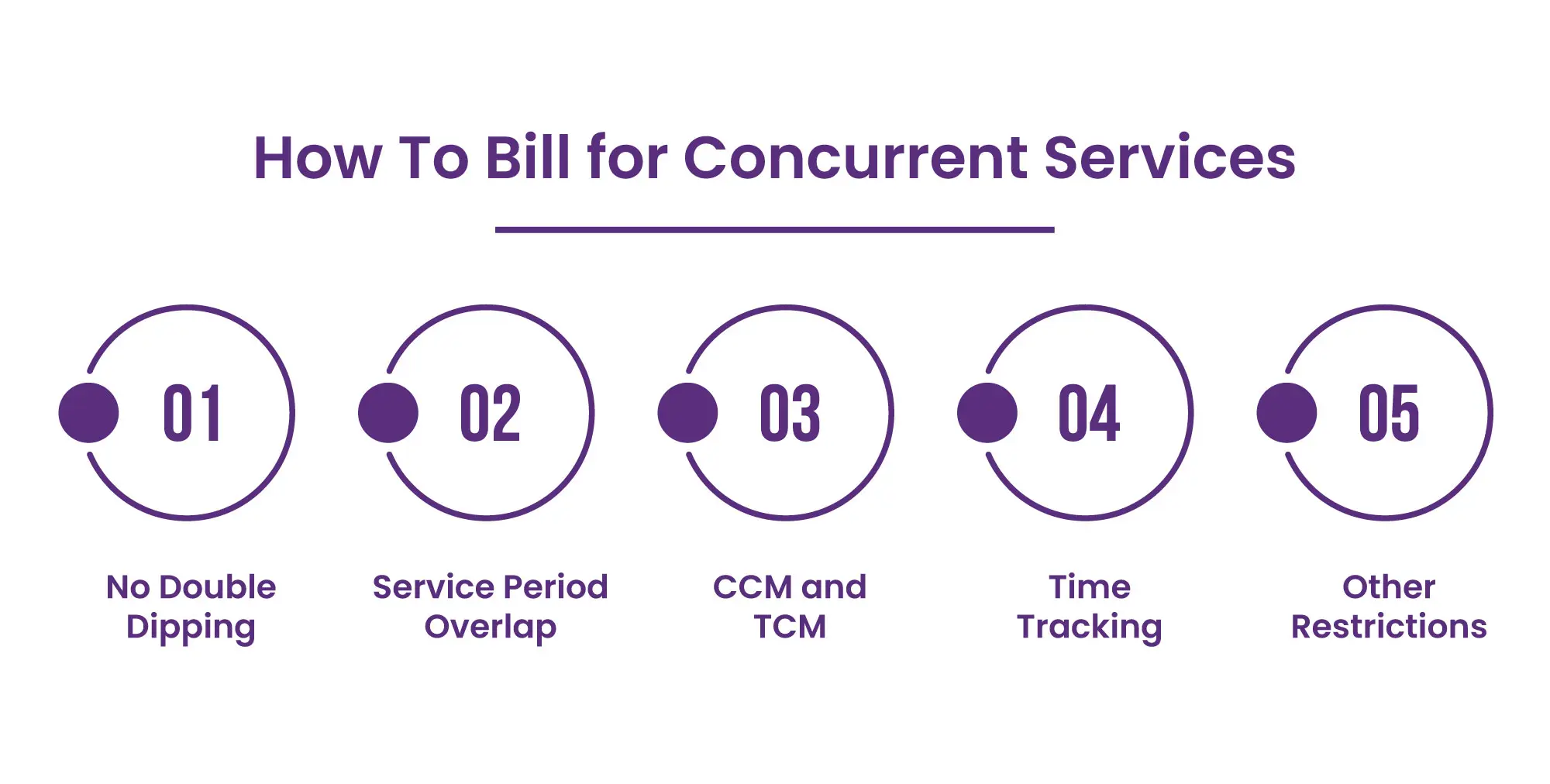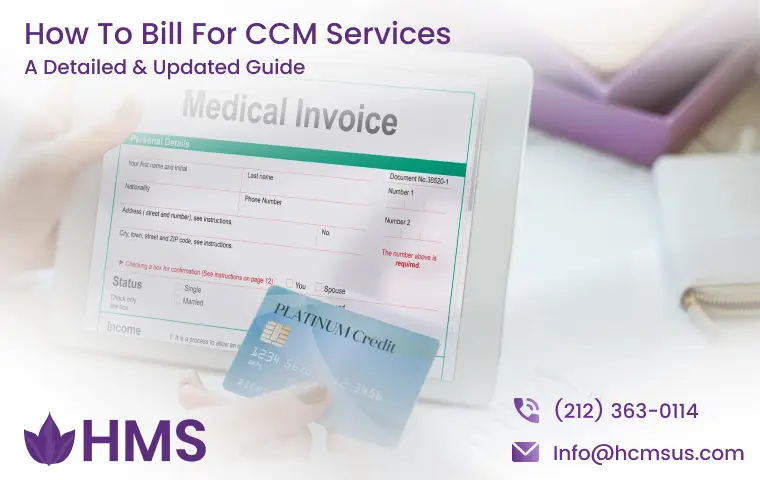Providing effective Chronic Care Management (CCM) requires a deep understanding of the guidelines set forth by CMS. Whether you're a seasoned provider or new to CCM, this blog post is your go-to resource. We'll break down the essential elements of the CCM guidelines and share the recent updates, ensuring you have the knowledge to provide top-notch care for your patients with chronic conditions and steer through the billing process with confidence.
CMS Recognizes CCM as Primary Care
The Centers for Medicare & Medicaid Services (CMS) recognizes the critical role of Chronic Care Management (CCM) as a primary care service. This recognition underscores the importance of CCM in improving the health and care of Medicare patients with multiple chronic conditions. CCM is more than just routine check-ups; it involves comprehensive care coordination, patient engagement, and proactive management of complex health needs.
This approach goes beyond treating acute illnesses, focusing instead on long-term health and well-being. By acknowledging CCM's vital role in primary care, CMS encourages providers to embrace this model and utilize it to enhance patient outcomes and reduce healthcare costs in the long run.
Foundational Aspects of CCM - What’s Involved?
Chronic Care Management (CCM) is a comprehensive approach to healthcare that goes beyond treating individual illnesses. It focuses on providing coordinated, patient-centered care for individuals with multiple chronic conditions. Here's a breakdown of what CCM involves:
Maintaining detailed electronic health records (EHRs) is crucial for tracking a patient's health journey, medications, allergies, and care plan progress.
Creating, implementing, and regularly updating personalized care plans that address all aspects of the patient's health, including medical, functional, and psychosocial needs.
Coordinating care across different healthcare settings, ensuring smooth transitions and continuity of care when patients move from hospitals to skilled nursing facilities or other care environments.
Promptly sharing information with other healthcare providers involved in the patient's care, fostering collaboration and ensuring everyone is on the same page.
Providing patients with round-the-clock access to healthcare professionals or clinical staff to address urgent needs and concerns.
Offering ongoing support to patients, including medication management, preventive care reminders, and assistance with self-management of chronic conditions.
Who Can Bill for CCM Services?
Chronic Care Management (CCM) services can be billed by a variety of healthcare professionals, ensuring that patients with chronic conditions receive comprehensive care coordination.
Eligible Practitioners:
-
Physicians: Including primary care physicians and specialists who manage chronic conditions.
-
Non-Physician Practitioners: This includes Certified Nurse Midwives (CNMs), Clinical Nurse Specialists (CNSs), Nurse Practitioners (NPs), and Physician Assistants (PAs).
While primary care practitioners most commonly bill for CCM services, specialists can also provide and bill for them if they are actively managing patients with chronic conditions. However, CCM services fall outside the scope of practice for certain limited-license physicians and practitioners, such as clinical psychologists, podiatrists, and dentists.
Clinical Staff Involvement:
In addition to the billing practitioners, clinical staff can also provide CCM services under the "incident to" provision. This means they work under the direct supervision and direction of the billing practitioner. This collaboration allows for a team-based approach to CCM, ensuring patients receive comprehensive care and support.
General Supervision:
For CCM services provided by clinical staff, general supervision by the billing practitioner is sufficient. This means the practitioner does not need to be physically present during service delivery but must maintain overall direction and control.
By clearly defining who can bill for CCM services, CMS ensures that qualified healthcare professionals are providing and coordinating care for patients with chronic conditions, ultimately leading to improved health outcomes and a better quality of life.
Core Criteria for Identifying Patients Eligible for CCM Services
Determining which patients are eligible for Chronic Care Management (CCM) services is a crucial first step in providing appropriate care and ensuring proper billing. The key criteria for eligibility include:
-
Multiple Chronic Conditions: Patients must have two or more chronic conditions.
-
Duration of Conditions: These conditions are expected to last at least 12 months or until the patient's death.
-
Significant Risk: The chronic conditions place the patient at significant risk of death, acute exacerbation/decompensation, or functional decline.
Identifying Eligible Patients:
While the above criteria provide a general framework, healthcare providers can use additional tools and strategies to pinpoint patients who may benefit from CCM:
-
Thoroughly examine patient charts and medical histories to identify those with multiple chronic conditions and assess their risk factors.
-
Refer to the Current Procedural Terminology (CPT) guidance for suggestions on identifying patients who may require CCM services. This may include factors like the number of medications, frequent hospital admissions, or emergency department visits.
-
The CPT prefatory language provides a typical patient profile that can help identify potential CCM candidates.
By proactively identifying eligible patients, healthcare providers can initiate CCM services early on, providing much-needed support and coordination of care for those with complex health needs. This early intervention can lead to improved patient outcomes, reduced healthcare costs, and a better quality of life for individuals managing multiple chronic conditions.
Mandatory Requirement for Starting CCM Services
Before Chronic Care Management (CCM) services can begin, there's a crucial step that healthcare providers must take: the initiating visit. So, what is the initiating visit in the context to ccm services?
“The initiating visit is a required face-to-face encounter between the billing practitioner and the patient. This visit serves as the foundation for establishing the CCM relationship and developing the patient's comprehensive care plan.”
When is it Required?
-
New Patients: An initiating visit is mandatory for all new patients who have not received CCM services before.
-
Returning Patients: Even for patients who have previously received CCM, an initiating visit is required if the billing practitioner hasn't seen them within the past year.
When Does an Initiating Visit Can Take Place?
The initiating visit can take place during one of the following encounters:
-
Comprehensive Evaluation and Management (E/M) Visit: A thorough assessment of the patient's health, including medical history, physical examination, and review of systems.
-
Annual Wellness Visit (AWV): A preventive visit focused on creating or updating a personalized prevention plan.
-
Initial Preventive Physical Exam (IPPE): A comprehensive physical exam conducted within the first 12 months of a patient's Medicare Part B enrollment.
Key Considerations:
-
CCM Discussion: The practitioner must discuss CCM services with the patient during the initiating visit, explaining the benefits, potential costs, and the patient's right to decline.
-
Separate Billing: The initiating visit itself is not considered part of CCM and can be billed separately.
-
Additional Billing: In cases where extensive assessment and care planning occur beyond the typical scope of the initiating visit, practitioners may also bill for HCPCS code G0506 once.
What Should a Care Plan Include?
A comprehensive care plan lies at the heart of effective Chronic Care Management (CCM). It serves as a roadmap for addressing all of the patient's health issues, with a special focus on managing their chronic conditions. Let's delve into the key elements that a robust CCM care plan should include:
1. Problem List:
A comprehensive list of the patient's health problems, particularly highlighting the chronic conditions that require ongoing management.
2. Expected Outcomes and Prognosis:
Clearly outlining the anticipated outcomes and prognosis for each chronic condition, helping set realistic expectations for the patient and care team.
3. Measurable Treatment Goals:
Establishing specific, measurable goals for managing each chronic condition, enabling the patient and providers to track progress and make adjustments as needed.
4. Cognitive and Functional Assessment:
Evaluating the patient's cognitive and functional abilities to identify any limitations or challenges that may impact their care plan and self-management.
5. Symptom Management Strategies:
Developing effective strategies for managing chronic symptoms, improving the patient's quality of life and minimizing the impact of their conditions.
6. Planned Interventions:
Detailing the planned interventions and treatments for each chronic condition, including medications, therapies, lifestyle modifications, and any necessary referrals.
7. Medication Management:
A comprehensive list of all medications, including dosages, frequencies, and potential interactions, along with strategies for ensuring medication adherence.
8. Environmental Evaluation:
Assessing the patient's living environment to identify any potential hazards or barriers that may impact their health and well-being.
9. Caregiver Assessment:
Evaluating the availability and capabilities of caregivers, ensuring they have the necessary support and resources to assist the patient effectively.
10. Coordination with External Resources:
Identifying and connecting with external resources, such as specialists, community organizations, and support groups, to enhance the patient's care and well-being.
11. Periodic Review and Revision:
Scheduling regular reviews of the care plan to monitor progress, address any challenges, and make necessary adjustments as the patient's needs evolve.
How To Bill for Concurrent Services
When it comes to billing for concurrent services alongside Chronic Care Management (CCM), there are specific guidelines to keep in mind. Adhering to these guidelines is crucial to ensure compliance and avoid claim denials. Let's explore some key considerations for billing concurrent services:

-
No Double Dipping: You cannot bill for both complex CCM and non-complex CCM for the same patient in the same calendar month.
-
Service Period Overlap: Avoid billing CCM during the same service period as certain other codes, such as those for home health care supervision, hospice care supervision, or specific ESRD services.
-
CCM and TCM: You can report CCM codes alongside Transitional Care Management (TCM) codes for the same patient during the 30-day TCM service period.
-
Time Tracking: Be mindful that time spent on services billed under other codes cannot be counted towards the CCM service time.
-
Other Restrictions: Consult the CPT instructions for additional codes that cannot be billed concurrently with CCM. Other provider billing restrictions may apply if you are participating in a CMS-sponsored model or demonstration program.
Billable CCM Codes for 2024
Understanding the specific codes used for billing Chronic Care Management (CCM) services is essential for accurate reimbursement.
|
Code |
Descriptor |
|||||||||||
|
99437 |
Chronic care management services, each additional 30 minutes, per calendar month. (Add-on code) |
|||||||||||
|
99439 |
Chronic care management services, each additional 20 minutes of clinical staff time, per calendar month. (Add-on code) |
|||||||||||
|
99487 |
Complex chronic care management services, first 60 minutes of clinical staff time, per calendar month. |
|||||||||||
|
99489 |
Complex chronic care management services, each additional 30 minutes of clinical staff time, per calendar month. (Add-on code) |
|||||||||||
|
99490 |
Chronic care management services, first 20 minutes of clinical staff time, per calendar month. |
|||||||||||
|
99491 |
Chronic care management services, first 30 minutes provided personally by a physician or other qualified healthcare professional, per calendar month. |
|||||||||||
|
G3002 |
Chronic pain management and treatment, monthly bundle including various services, requires initial face-to-face visit, first 30 minutes personally provided by physician or other qualified healthcare professional, per calendar month. |
|||||||||||
|
G3003 |
Each additional 15 minutes of chronic pain management and treatment, per calendar month. (Add-on code for G3002) |
|||||||||||
Beyond CCM
While Chronic Care Management (CCM) serves as a cornerstone for managing patients with multiple chronic conditions, it's not the only care management service available. Let's explore a few other options that can complement CCM or address specific patient needs:
1- Principal Care Management (PCM)
PCM is similar to CCM but focuses on patients with a single high-risk chronic condition or those with multiple chronic conditions where one poses a significant risk. It involves comprehensive care coordination, but with a narrower scope compared to CCM.
2- Principal Illness Navigation (PIN)
PIN is designed for patients with a single serious, high-risk condition that could lead to hospitalization, functional decline, or even death. This service helps navigate complex care needs, frequent medication adjustments, and substantial caregiver assistance.
3. Community Health Integration (CHI)
CHI aims to bridge the gap between healthcare and social needs. It helps patients address unmet social determinants of health that impact their overall well-being and ability to manage their medical conditions.
By understanding the full range of care management services available, healthcare providers can tailor their approach to meet the unique needs of each patient. Combining CCM with other services like PCM, PIN, or CHI can create a holistic and comprehensive care plan that addresses both medical and social needs, leading to improved patient outcomes and a better quality of life.
ABOUT AUTHOR

John Wick
As a blog writer with years of experience in the healthcare industry, I have got what it takes to write well-researched content that adds value for the audience. I am a curious individual by nature, driven by passion and I translate that into my writings. I aspire to be among the leading content writers in the world.
